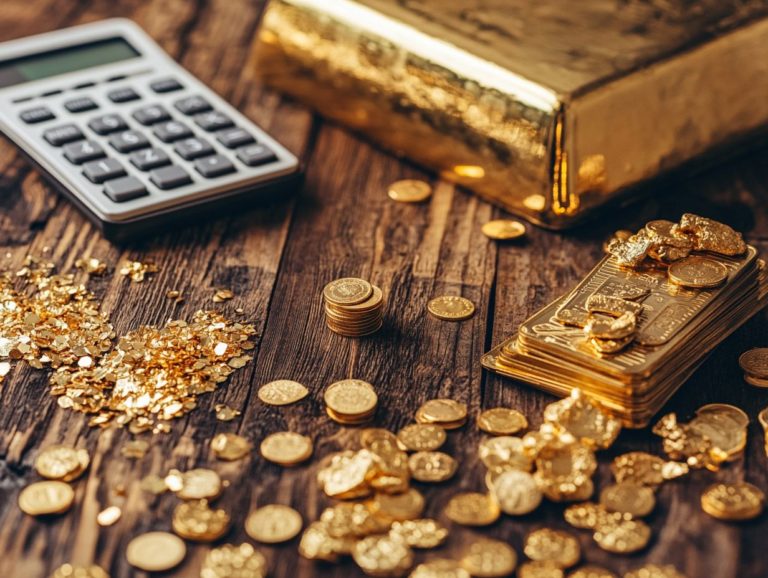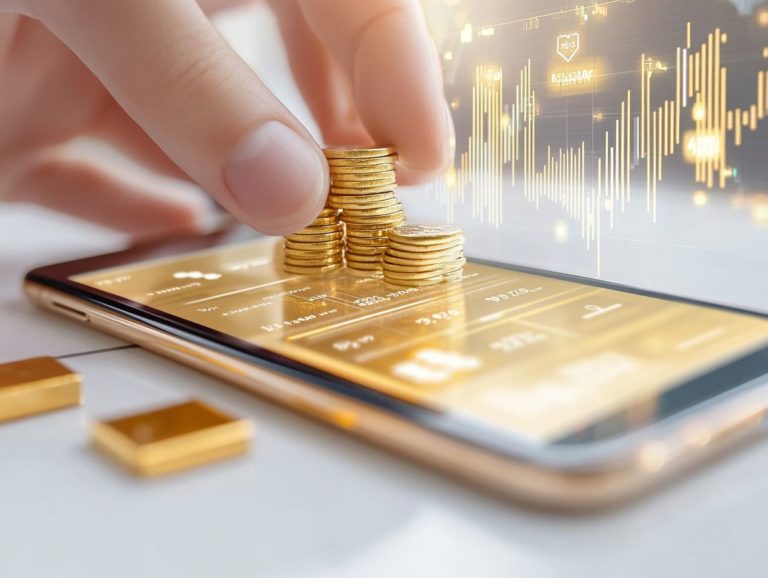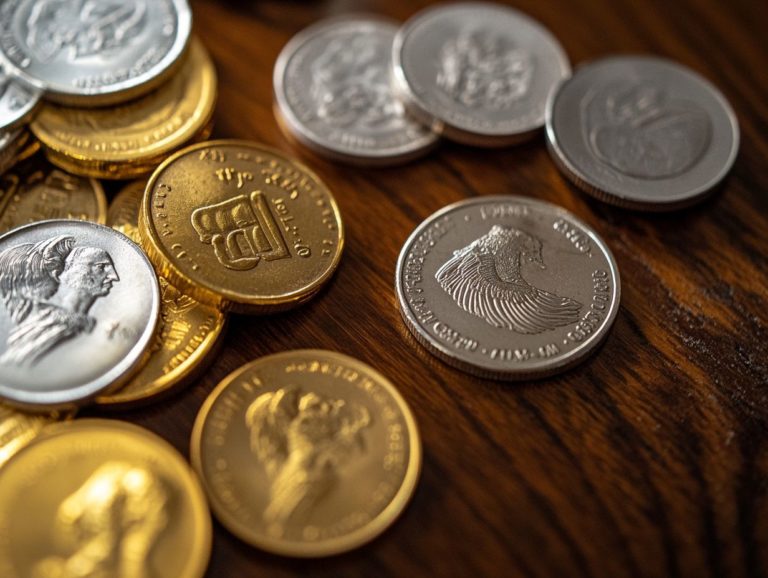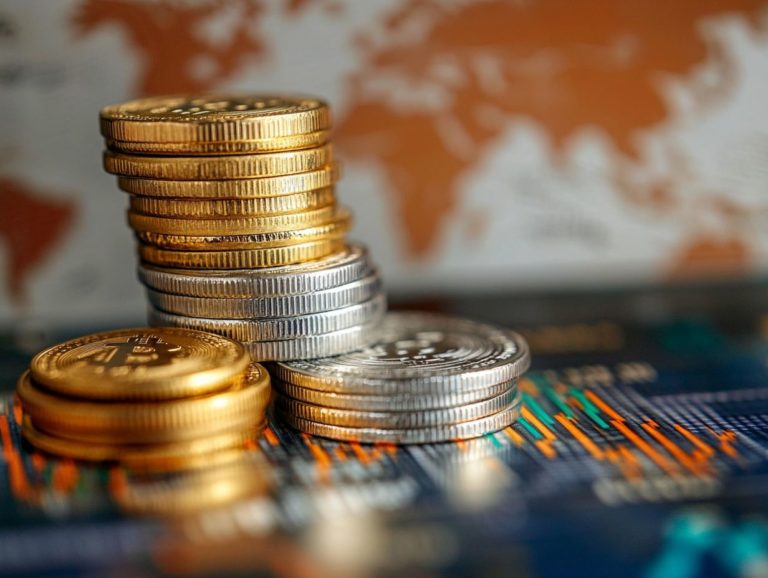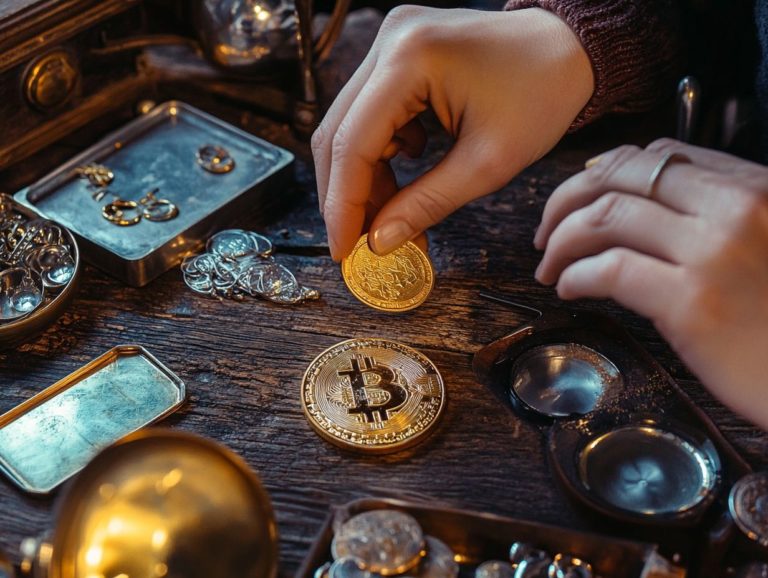Alternative Precious Metals: Rhodium and Beyond
In the realm of precious metals, rhodium is carving out its own niche, often finding itself in the shadow of gold and silver.
This article delves into the unique properties and versatile applications of rhodium, underscoring its importance across various industries. It also explores other alternative precious metals such as palladium, ruthenium, and iridium, offering insights into their roles and market potential.
You ll find a thorough examination of the benefits and risks associated with investing in these metals, along with a glimpse into what the future might hold for this intriguing market. Whether you’re a seasoned investor or simply intrigued, there s a wealth of information waiting to be uncovered!
Contents
Key Takeaways:
- Discover the potential of alternative precious metals such as rhodium, palladium, ruthenium, and iridium.
- Learn about the unique properties and diverse applications of rhodium, making it a valuable choice for investors and industries alike.
- Explore the benefits and risks of diversifying your investment portfolio with alternative precious metals.
- Stay informed on the future outlook for these metals.
What are Alternative Precious Metals?
Alternative precious metals such as palladium, tungsten, and rhodium serve as valuable substitutes for traditional favorites like gold and silver. These metals are increasingly in demand for a variety of applications, from fine jewelry to investment opportunities and industrial uses.
This growing interest makes them essential considerations in today s jewelry market.
As you become more informed about your options, you’ll find the appeal of these unique materials has surged, prompting a noticeable shift in market trends and consumer preferences.
In terms of jewelry styles, alternative metals bring a contemporary flair, offering distinctive colors and durability that resonate with a modern audience.
Each metal possesses its own unique characteristics. For example, palladium is renowned for being less likely to cause allergic reactions and has a lightweight feel, while tungsten s remarkable hardness makes it perfect for everyday wear.
This evolving landscape demonstrates that alternative precious metals not only present viable investment opportunities but also enrich the aesthetic diversity of jewelry offerings.
Rhodium: Properties and Uses
Rhodium is a rare and precious metal, celebrated for its remarkable durability.
It also has outstanding reflective qualities, making it a sought-after option for jewelry. Rhodium plating elevates the allure of white gold and silver pieces, giving them a stunning, polished finish.
Unique Properties of Rhodium
Rhodium boasts remarkable durability, exceptional reflectivity, and hypoallergenic qualities, making it an ideal choice for jewelry and industrial needs.
This extraordinary metal isn t just resistant to tarnishing and scratching; it also maintains its brilliant shine over time, distinguishing it from other precious metals.
If you’re sensitive to metals or suffer from allergies, rhodium’s hypoallergenic nature offers peace of mind, allowing you to wear beautiful jewelry without discomfort.
Its natural resistance to corrosion enhances its longevity, ensuring that your jewelry pieces remain both beautiful and functional for years to come.
Beyond its aesthetic allure, rhodium s use in plating can elevate the overall quality of your jewels, providing a protective layer that safeguards the underlying metal.
Applications in Different Industries
Rhodium finds its way into a diverse array of industries, from the exquisite realm of fine jewelry, where it serves as lustrous plating to enhance aesthetics, to the automotive sector, where it plays a crucial role in catalytic converters devices that help reduce pollution from car exhaust.
In the automotive landscape, rhodium is important for reducing harmful emissions, making it a key component in meeting environmental standards.
In the electronics industry, rhodium is valuable for its exceptional resistance to corrosion and outstanding conductivity, facilitating the creation of high-performance connectors and circuit boards.
This remarkable combination of durability and efficiency underscores rhodium’s significance in sectors that rely on dependable materials.
As industries continue to evolve, the applications of rhodium are poised to expand, further emphasizing its essential role in modern technology and sustainable practices.
Discover the potential of these metals today and stay ahead in the market!
Other Alternative Precious Metals
In addition to rhodium, metals like palladium, ruthenium, and iridium are valuable alternatives.
Each metal has unique characteristics and applications, making it important in both jewelry and investment markets.
Overview of Palladium, Ruthenium, and Iridium
Palladium is lightweight and hypoallergenic. Ruthenium and iridium are known for their exceptional hardness and wear resistance.
These traits make them desirable for various jewelry styles, enhancing their appeal for buyers like you.
Palladium s softness allows for intricate designs, making it a great choice for engagement rings and elegant necklaces.
On the other hand, ruthenium and iridium are durable, perfect for everyday wear, and increasingly popular in statement pieces.
The hypoallergenic benefits and striking aesthetics attract those with sensitive skin and fashion-savvy individuals seeking unique jewelry.
Investing in Alternative Precious Metals
Investing in alternatives like palladium and rhodium offers distinct advantages along with inherent risks.
This landscape requires careful examination of market trends and prices to navigate effectively.
Benefits and Risks of Diversifying with Alternative Metals
Diversifying your portfolio with alternative metals can reduce market volatility and unlock high returns.
However, consider the associated risks carefully.
Adding assets like silver, platinum, and palladium can create a buffer against economic fluctuations.
These metals hold basic worth and serve unique purposes across industries, making them appealing during inflation or downturns.
While higher returns are enticing, weigh the risks tied to shifting demand and geopolitical factors that could disrupt market stability.
A balanced investment strategy should mix these metals with traditional assets, helping you manage market volatility while capitalizing on potential rewards.
Future Outlook for Alternative Precious Metals
Alternative precious metals are set for a bright future. Rising demand, driven by technological advancements and environmental awareness, opens up many opportunities.
Trends and Predictions for These Metals
Current trends show that alternative precious metals are gaining traction in both investment and jewelry markets.
As consumers become more environmentally conscious, metals like titanium, palladium, and lab-grown options are recognized for their durability and ethical sourcing.
This shift is supported by innovation in jewelry design, where artisans explore unconventional pairings to showcase alternative metals’ versatility.
Investment analysts note a trend among millennials, who prefer unique, personalized pieces that emphasize sustainability and style.
As the market evolves, these alternatives will significantly shape future investment strategies and consumer preferences.
Frequently Asked Questions
What are alternative precious metals?
Alternative precious metals are rare, valuable elements used in various industries such as jewelry, electronics, and automotive. They serve as substitutes for traditional precious metals like gold, silver, and platinum, gaining popularity due to their unique properties and increasing market demand.
What is Rhodium?
Rhodium is a shiny silver-white metal that belongs to the platinum group. It’s tough against corrosion and has a high melting point, making it perfect for catalytic converters, jewelry, and plating.
Other Alternative Precious Metals
Palladium, ruthenium, and iridium are also attracting attention. Like rhodium, these metals are valuable for industrial and commercial applications.
Why Are These Metals Popular?
The push for alternative energy and sustainable technologies is increasing the demand for rare metals. Investors and manufacturers are seeking these precious elements more than ever.
Is Investing in Alternative Metals Smart?
Investing in alternative precious metals can be rewarding. However, it s crucial to research thoroughly and consult with experts before making any commitments.
How to Purchase Alternative Precious Metals
You can buy rhodium through options like physical bars, coins, ETFs, or shares in mining companies. Always do your homework and consult with a financial advisor before investing.

